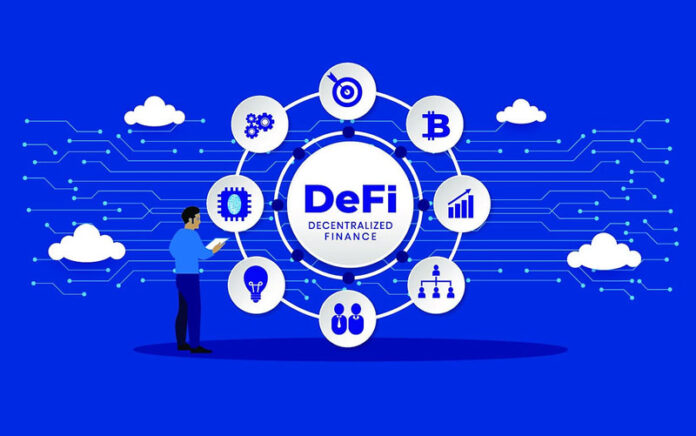Have you ever wondered about the future of finance? How will it evolve and adapt to the changing needs of our fast-paced world? Well, look no further than decentralized finance, or DeFi for short. In recent years, DeFi has emerged as a groundbreaking concept that has the potential to revolutionize the way we think about and interact with traditional financial systems.
So, let’s dive into the world of DeFi and uncover the exciting possibilities it holds.
What is Decentralized Finance?
Decentralized finance refers to a new paradigm in the financial industry that aims to eliminate intermediaries and central authorities, such as banks and governments, from financial transactions and services. Instead, it leverages blockchain technology and smart contracts to create a transparent, secure, and open financial ecosystem that is accessible to anyone with an internet connection.
In traditional finance, we rely on banks to hold our money, process transactions, and provide loans. We also need intermediaries like brokers to facilitate trades in the stock market. These centralized systems come with limitations, such as high fees, slow transaction times, and limited accessibility. DeFi, on the other hand, seeks to address these limitations by offering a decentralized alternative that is accessible to anyone, anywhere, at any time.
The Building Blocks of DeFi
At the core of DeFi are smart contracts, which are self-executing contracts with predefined rules and conditions written into code. These smart contracts run on blockchain platforms like Ethereum, allowing for the creation and execution of various financial instruments and applications in a decentralized manner.
One of the most popular use cases of DeFi is decentralized lending and borrowing. Through platforms like Compound and Aave, individuals can lend out their cryptocurrencies and earn interest on their holdings. Meanwhile, borrowers can use their digital assets as collateral to secure loans without the need for a traditional credit check.
Another key aspect of DeFi is decentralized exchanges (DEXs). DEXs, such as Uniswap and SushiSwap, enable users to trade cryptocurrencies directly with one another without relying on a centralized exchange. This not only eliminates the need for intermediaries but also enhances security and reduces the risk of hacks or funds being frozen.
Benefits of Decentralized Finance
So, why is decentralized finance gaining so much attention? Well, it offers several compelling benefits that have the potential to disrupt the traditional financial landscape. Let’s take a closer look:
1. Financial Inclusion
Decentralized finance has the power to bring financial services to the billions of unbanked individuals around the world. With just a smartphone and internet access, anyone can participate in DeFi and access a wide range of financial services, including savings, loans, investments, and more. This has the potential to empower individuals and communities that were previously excluded from the traditional banking system.
2. Enhanced Security
By leveraging blockchain technology, DeFi provides enhanced security and transparency. Transactions recorded on the blockchain are immutable and cannot be altered, making fraud and manipulation extremely difficult. Additionally, the use of smart contracts ensures that transactions are executed automatically based on predefined rules, eliminating the need for intermediaries and reducing the risk of human error.
3. Lower Costs
Traditional financial systems often come with high fees and complex fee structures. DeFi, on the other hand, leverages automation and eliminates intermediaries, resulting in significantly lower costs for users. Whether it’s sending money overseas, trading assets, or taking out a loan, users can expect reduced fees and greater control over their finances.
4. Open and Permissionless
Decentralized finance operates on open and permissionless networks, meaning anyone can participate and build on top of existing protocols. This fosters innovation and allows developers to create new financial products and services without seeking approval from centralized authorities. The open nature of DeFi also promotes interoperability, enabling different applications and protocols to seamlessly interact with one another.
Challenges and Risks
While the potential of decentralized finance is vast, it’s important to acknowledge the challenges and risks associated with this emerging field. Here are a few key considerations:
1. Security Risks
While blockchain technology provides enhanced security, it’s not immune to vulnerabilities. Smart contracts can still have bugs or be exploited by malicious actors. Additionally, the decentralized nature of DeFi makes it difficult to recover lost funds or reverse transactions, so users must be cautious and take responsibility for the security of their assets.
2. Regulatory Uncertainty
As decentralized finance continues to grow, regulators around the world are grappling with how to approach and regulate this emerging field. The lack of clear regulations can create uncertainty for both developers and users, potentially stifling innovation or leading to compliance issues in the future.
3. Scalability
The current state of blockchain technology faces scalability challenges, with limitations on transaction throughput and high gas fees during peak demand. As DeFi gains mainstream adoption, addressing scalability becomes crucial to ensure a seamless user experience and accommodate a larger user base.
The Future of Decentralized FinanceThe future of decentralized finance is incredibly promising. As the technology matures and addresses its challenges, we can expect to see even greater adoption and innovation in this space. Here are a few areas where decentralized finance is poised to make a significant impact:
1. Cross-Border Payments
The traditional process of sending money across borders can be slow, expensive, and cumbersome. Decentralized finance has the potential to revolutionize cross-border payments by enabling fast, low-cost transactions without the need for intermediaries. With DeFi, sending money to family or friends in another country could be as simple as sending an email.
2. Asset Tokenization
Tokenization refers to the process of representing real-world assets, such as real estate or artwork, as digital tokens on the blockchain. This allows for fractional ownership, increased liquidity, and easier transferability of traditionally illiquid assets. Decentralized finance can unlock new investment opportunities by making these tokenized assets accessible to a wider range of investors.
3. Decentralized Identity and Governance
Decentralized finance can also play a role in establishing decentralized identity systems, where users have control over their data and can selectively share it with service providers. This not only enhances privacy but also enables more efficient and secure Know Your Customer (KYC) processes. Additionally, decentralized governance models, enabled by blockchain-based voting mechanisms, can ensure that decision-making within financial systems is more democratic and transparent.
4. Integration with Traditional Finance
While DeFi aims to disrupt traditional finance, there is also potential for integration and collaboration between the two. We can envision a future where decentralized and centralized financial systems coexist, leveraging each other’s strengths to create a more inclusive and efficient financial ecosystem. This could involve bridging the gap between cryptocurrencies and fiat currencies, enabling seamless transitions between the two worlds.
Conclusion
The rise of decentralized finance marks a new era in finance, one that empowers individuals, enhances security, and fosters financial inclusion. By leveraging blockchain technology and smart contracts, decentralized finance offers a transparent, open, and permissionless alternative to traditional financial systems. While challenges and risks remain, the potential benefits are immense.
As we move forward, it’s crucial to strike a balance between innovation and regulation to ensure that decentralized finance can flourish while maintaining user protection and market integrity. The future looks bright for decentralized finance, and it’s an exciting time to be a part of this transformative journey.






